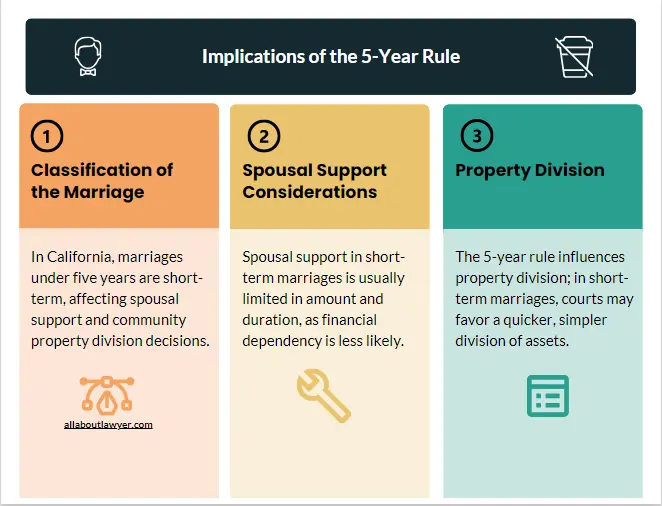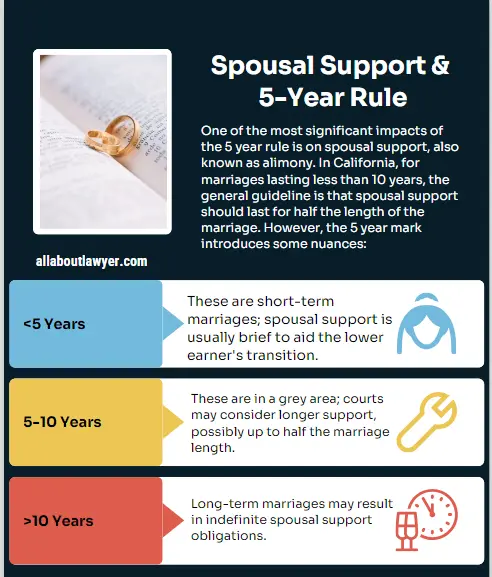California Divorce Law 5 Year Rule Legal Process & How the 5-Year Rule Affects Your Rights In CA?
California’s divorce laws are complex and multifaceted, with various rules and regulations that can significantly impact the outcome of a marital dissolution. One such rule that often comes into play is the so-called “California Divorce Law 5 Year Rule” in California divorce law. This article aims to provide a thorough understanding of this rule, its implications, and how it affects various aspects of divorce proceedings in the Golden State.
Table of Contents
What is the California Divorce Law 5 Year Rule?
The California divorce law 5 year rule is not a single, specific statute but rather a collection of legal principles and precedents that come into play when a marriage has lasted for five years or more. This threshold is significant in California family law as it often marks the difference between what is considered a “short-term” and a “long-term” marriage.
California’s 5-year rule is a significant factor in determining the division of community property during a divorce. This rule states that if a couple has been married for five years or more, their assets and debts acquired during the marriage are generally considered community property and subject to equal division.
The Importance of Community Property
In California, community property is any property acquired by either spouse during the marriage, regardless of who is in whose name. This includes assets such as:
* Real estate
* Bank accounts
* Investments
* Retirement accounts
* Personal belongings
Related article: Why No Fault Divorce Is Bad?
Exceptions to the 5-Year Rule
While the 5-year rule is a general guideline, there are exceptions:
* Separate Property: Property acquired before marriage or inherited during the marriage is typically considered separate property and not subject to equal division.
* Gifts and Inheritances: Gifts and inheritances received by one spouse during the marriage are generally considered separate property.
* Property Acquired by Purchase with Separate Funds: Property purchased solely with separate funds is also considered separate property.
The Significance of Marriage Duration in California Divorce Law
In California, the length of a marriage plays a crucial role in determining various aspects of a divorce settlement. The five-year mark is particularly important because it can affect:
1. Spousal support (alimony) duration
2. Property division
3. The court’s approach to financial matters
Implications of the 5-Year Rule
1. Classification of the Marriage: Under California law, marriages lasting less than five years are typically classified as short-term marriages. This classification influences the court’s decisions regarding spousal support and the division of community property.
2. Spousal Support Considerations: In short-term marriages, spousal support (alimony) is often limited in both amount and duration. The rationale is that spouses in a short-term marriage are less likely to have become financially dependent on one another.
3. Property Division: The 5-year rule also impacts how property is divided. In California, community property laws dictate that assets acquired during the marriage are typically divided equally. However, in short-term marriages, the court may be more inclined to order a more immediate and straightforward division of property, reflecting the shorter duration of the marital partnership.

Spousal Support and the 5 Year Rule
One of the most significant impacts of the 5 year rule is on spousal support, also known as alimony. In California, for marriages lasting less than 10 years, the general guideline is that spousal support should last for half the length of the marriage. However, the 5 year mark introduces some nuances:
– For marriages under 5 years: These are typically considered short-term marriages. Spousal support, if awarded, is often for a brief period to help the lower-earning spouse transition to financial independence.
– For marriages between 5 and 10 years: These fall into a grey area. While still considered “short-term” by some standards, the 5 year threshold often leads courts to consider longer support durations, potentially up to half the length of the marriage.
– For marriages over 10 years: These are considered long-term marriages in California. In such cases, the court may not set a specific end date for spousal support, potentially leading to indefinite support obligations.
It’s important to note that while these are general guidelines, California family courts have significant discretion in determining spousal support based on various factors beyond just the length of the marriage.

The Legal Process of Divorce in California
The divorce process in California involves several key steps:
1. Separation: The couple must live separate and apart for a minimum period, which can vary depending on the circumstances.
2. Filing for Divorce: One spouse must file a petition for dissolution of marriage with the court.
3. Service of Process: The other spouse must be served with a copy of the petition.
4. Discovery: The parties exchange information and evidence related to the divorce.
5. Negotiations and Mediation: Attempts are made to reach a settlement agreement outside of court.
6. Trial: If a settlement cannot be reached, the case proceeds to trial.
7. Judgment: The court issues a final judgment of dissolution of marriage, which outlines the terms of the divorce.
Factors Affecting Property Division
In addition to the 5-year rule, several other factors can influence the division of property in a California divorce:
* Fault Grounds: While California is a no-fault divorce state, evidence of misconduct by one spouse may affect the division of property.
* Economic Circumstances: The financial circumstances of both spouses, including income, assets, and debts, will be considered.
* Spousal Support: The need for spousal support will also be evaluated.
* Child Custody and Support: If there are children involved, the court will determine child custody and support arrangements.
Exceptions and Special Circumstances
While the 5 year rule is an important guideline, it’s not an absolute law. California family courts have the discretion to make decisions based on the unique circumstances of each case. Some factors that might lead to exceptions include:
1. Health Issues: If one spouse has significant health problems, this might influence support decisions regardless of the marriage duration.
2. Child-rearing Responsibilities: The presence of children and the division of child-rearing duties can impact financial decisions, even in shorter marriages.
3. Career Sacrifices: If one spouse gave up career opportunities to support the other’s career or to raise children, this might be considered even in marriages shorter than 5 years.
4. Domestic Violence: In cases involving domestic violence, courts may deviate from standard guidelines to protect the victim’s interests.
Residency Requirements and the 5-Year Rule
To file for divorce in California, at least one spouse must meet the state’s residency requirements. Specifically, one spouse must have lived in California for at least six months before filing, and in the county where the divorce is filed for at least three months. These residency requirements are separate from the 5-year rule but are essential for initiating the divorce process.
Legal Separation vs. Divorce Under the 5-Year Rule
Legal separation is an alternative to divorce that allows couples to live apart and formalize arrangements for support and property division without dissolving the marriage. In cases where the 5-year rule applies, legal separation may offer a way to avoid the implications of a short-term marriage classification, particularly if the couple wishes to maintain certain legal benefits of marriage while living apart.
The Role of a Family Law Attorney
Handling the complexities of divorce law in California can be overwhelming. Hiring a qualified family law attorney is highly recommended to ensure your rights are protected and to achieve the best possible outcome. A skilled attorney can guide you through the legal process, negotiate on your behalf, and represent you in court if necessary.
Related Articls For You:
How To Pay For a Divorce Lawyer With No Money?
California Divorce Law 5 Year Rule Legal Process
Divorcing Because of Mother in Law
Conclusion
The California divorce law 5 year rule, while not a strict legal statute, serves as an important guideline in divorce proceedings. It marks a significant threshold that can influence decisions about spousal support, property division, and the overall approach to financial matters in a divorce. However, it’s crucial to remember that every divorce case is unique, and courts have the discretion to make decisions based on the specific circumstances of each case.
If you’re facing a divorce in California, whether you’re approaching the 5 year mark or well past it, it’s essential to understand these principles and seek professional legal advice. An experienced family law attorney can help you navigate the complexities of California divorce law and work towards a fair and equitable resolution.
Read also: Prince Harry Lawsuit
Read also: Can You Get Pilot License with DUI?
FAQs
Is there a hard and fast rule about alimony after 5 years of marriage in California?
No, there isn’t a strict rule. The 5 year mark is a guideline that can influence decisions, but courts consider many factors when determining alimony.
Does the 5 year rule mean I’m guaranteed alimony if my marriage lasted longer than 5 years?
No, it doesn’t guarantee alimony. The court considers multiple factors, including each spouse’s financial situation and earning capacity.
How does the 5 year rule affect property division in a California divorce?
The 5 year rule doesn’t directly affect property division, but longer marriages often involve more complex asset commingling, which can impact how property is divided.
What is the difference between separate property and community property in California?
Separate property is acquired before marriage or through inheritance/gift during marriage, while community property is acquired during the marriage and is subject to equal division.
What are the factors considered when determining child custody in California?
The court considers the child’s best interests, including factors such as the child’s health, safety, and welfare, as well as the ability of each parent to care for the child.
Does the 5 year rule apply to same-sex marriages in California?
Yes, California applies the same divorce laws and principles to all marriages, regardless of the spouses’ genders.
About the Author

Sarah Klein, JD, is a former family law attorney with over a decade of courtroom and mediation experience. She has represented clients in divorce, custody cases, adoption, Alimony, and domestic violence cases across multiple U.S. jurisdictions.
At All About Lawyer, Sarah now uses her deep legal background to create easy-to-understand guides that help families navigate the legal system with clarity and confidence.
Every article is based on her real-world legal experience and reviewed to reflect current laws.
Read more about Sarah
